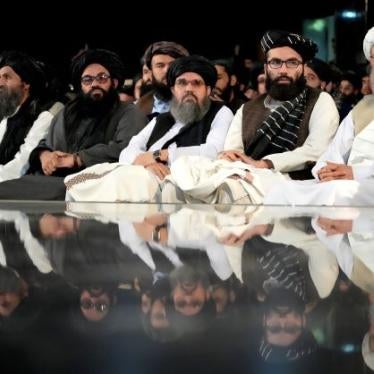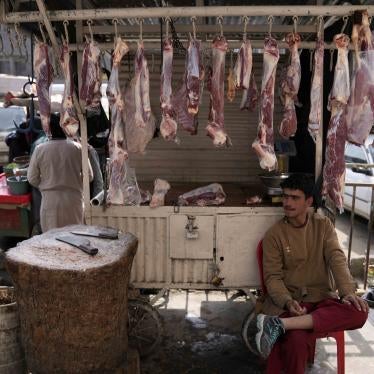By Fereshta Abbasi, Human Rights Watch
August 24, 2022
Thank you for inviting me to testify at this important hearing and for bringing increased attention to the situation for religious freedom in Afghanistan.
I will get straight to the point. Religious freedom does not exist in Afghanistan.
Since the Taliban takeover in August 2021, Taliban authorities, citing an order from their leader Hibatullah Akhundzada, have stated that the laws of the previous government are no longer in effect and that only Sharia, or Islamic law, is applicable in Afghanistan.
The Taliban’s interpretations of Sharia, however, and the new rules and policies they have announced since taking over, cannot be found in any other country with Islamic populations. Almost all of their rules severely restrict Afghans’ basic human rights, and in particular the rights of women and girls. Under the Taliban’s extremist interpretations of Sharia, Taliban officials have imposed a de facto ban on girls’ secondary education, mandated women’s bodies and faces be completely covered when they are outside their homes, and prohibit women from traveling or working without a male relative as a chaperone.
There is no other country in the world where women face such sweeping violations of their basic human rights.
The Taliban have also banned various other activities by men and women, citing Sharia, including prohibiting unrelated men and women from appearing in public together or going to parks and restaurants.
These restrictions also violate the rights of Afghans to live according to their own conceptions of their religious faiths.
But there are further abuses. The Taliban are failing to protect Afghanistan’s religious minorities from violence, and are subjecting some groups to persecution.
The Taliban follow an ultraconservative Sunni interpretation of Islam. Yet approximately 10 to 15 percent of Afghans are Shia, and there are a significant number of Sufi, small numbers of Ahmadis, and some Hindus and Sikhs in urban areas. The Taliban have not stated that Shia or Sufi practices are forbidden. And the authorities have also promised protection to Hindus and Sikhs, although members of both communities have continued to leave Afghanistan, and only a little over 100 of either remain.
The Taliban does not consider Ahmadis to be Muslims and they have persecuted some of their leaders in the past as blasphemers. Most of Afghanistan’s miniscule population of non-Muslims also continue to live under threat of persecution, in particular Bahai, Buddhists, Zoroastrians, and Christians, who practice secretly or have gone into hiding. An unknown number of Afghans consider themselves agnostic or atheist or otherwise do not practice Islam or any other religion. Taliban authorities view anyone who has left Islam to have committed apostacy, a crime they believe should be punished by death.
Serious problems for Shia, Sufi, and non-Muslims in Afghanistan today come from the Islamic State of Khorasan Province (ISKP), the Islamic State’s (ISIS) affiliate in Afghanistan, an armed extremist group. The ISKP has repeatedly carried out suicide bombings and other armed attacks against Shia communities, in particular ethnic Hazara. The Hazara, a predominantly Shia ethnic group, have faced discrimination and abuse by successive Afghan governments for over a century. Since the Taliban takeover, the ISKP has claimed responsibility for 13 attacks against members of the Hazara community and are implicated in at least three more. These attacks have killed at least 700 people.
We cannot overstate how horrendous these attacks have been. An ISKP suicide bombing on April 19 at a high school in Dashte-e Barchi in west Kabul—a predominantly Hazara and Shia area—killed and injured more than 20 students and education staff. (This neighborhood previously suffered several devastating attacks before the Taliban took power: a May 2021 attack by ISKP on a girls’ high school that killed almost 50 students, mostly girls, and injured over 100 more, and the May 2020 attack on the Médecins Sans Frontières (MSF)-supported maternity wing of the Dasht-e Barchi hospital.) On April 21, the ISKP then carried out a suicide bombing of the Seh Dokan Mosque in Mazar-e Sharif, one of Afghanistan’s largest Shia mosques, killing 31 people and wounding 87 others.
In addition to these attacks, on April 27 suspected ISKP members killed five Hazara men on their way to the Dare-Suf coal mine in Samangan province. The next day, a bomb explosion killed 9 people and wounded 13 others in a public vehicle carrying Hazara passengers in Mazar-e Sharif.
The Taliban have condemned ISKP attacks and provided some families of victims with minor financial payments. Authorities have also vowed to protect vulnerable groups from attacks in the future. But there are few signs authorities are taking active or significant steps to do so.
This is the situation that Afghans are enduring today under Taliban rule. The entire population is being forced to live according to ultraconservative interpretations of one branch of a single religion. Over half of the population—women and girls—are subjected to sweeping and severe violations of their basic human rights. Afghan men and boys also suffer abuses under Taliban edicts. And the Taliban is doing little as an Islamic State offshoot hunts for opportunities to murder Afghanistan’s vulnerable religious minorities. Afghanistan is a nightmare for religious freedom -- and other basic human rights.
Taliban leaders need to recognize that their vision for Afghanistan’s future is built on oppression, and that to address the concerns of all Afghans, they need to take a rights-respecting approach to religion and other fundamental freedoms. This will mean engaging with the international community in a more cooperative manner and adopting international standards on human rights—for instance, by reversing policies violating the rights of women and girls to education, employment, and free movement and fully cooperating with the United Nations Assistance Mission in Afghanistan and UN Human Rights Council mechanisms. Greater Taliban respect for human rights can also contribute to better international cooperation in addressing the threat posed by ISKP, especially to religious minorities in Afghanistan.
The US government—which has made serious missteps in Afghanistan over the past 20 years—can nevertheless make important contributions to human rights, particularly the rights of women, girls, and religious minorities. This includes continuing to negotiate with the Taliban on shared concerns about Afghanistan’s humanitarian and economic situation and the threat posed by the ISKP. The US should support efforts by the UN mission and UN Human Rights Council to monitor, report on, and ensure accountability for human rights violations. The US should urge other governments to press the Taliban to improve human rights, as coordinated efforts are critical for Afghanistan’s future.
We cannot give up.
Thank you.








